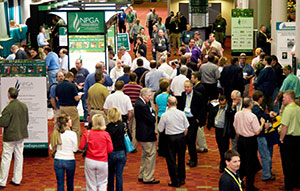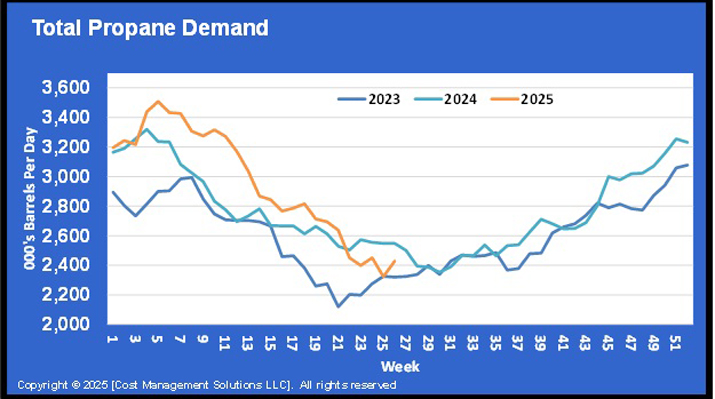Tricks of the Trade Show
Don’t just plan to attend a propane industry event; attend it with a plan to boost your business profits.
 So much to learn. So many people to see. And so little time.
So much to learn. So many people to see. And so little time.
You’ll face that predicament at your next propane industry trade show. You are not alone: Confronted with crowded aisles and hectic booths, attendees too often return home with no more than a confused mass of general impressions.
You can do better. Trade shows can be powerful tools for boosting business profits. The secret is to plan for success, spend time wisely and prioritize tasks.
How to? Read these tips from trade show experts:
Tip 1: Set your goals
“Before arriving at the show, make a plan with specific ‘keeper’ ideas,” says Mina Bancroft, a management consultant in Palo Alto, Calif. “Then prioritize them.’”
Include specific descriptions of what you want to find at the show. Here are some possibilities: New items of merchandise. Line extensions in certain categories. Lower costs in existing lines. More reliable sources. Promotional goods. Select the best and list them in order of importance.
Next step: Translate your goals into an “A” list of vendors to see.
“Do some research on the show’s website to identify companies and booth numbers,” says Howard Friedman, a trade show consultant in suburban Los Angeles. “That will assure that you see the most important things.”
It’s also smart to draw up a “B” list of trade show goals, Friedman suggests.
“While these items may not be ‘mission critical,’ they can help open your eyes to innovations and new ways to approach problems you may have,” he says.
Tackle secondary goals in the remaining time after completing your primary ones.
Bonus tip: Ask yourself, “What is the biggest problem I have in my business?” Write it down and take it to the show to get answers from exhibitors.
Tip 2: Strategize your walking pattern
Once at the show, it’s tempting to spend the first hours performing a walk-through. That can be a mistake.
“The last thing you want to do is shop the floor as you shop a flea market, just walking down the aisles and looking at things,” says Peter LoCascio, a Salem, Ore.-based consultant.
The clock moves quickly. It’s easy to run out of time before you accomplish what you need to do, he adds.
“Too many times, a couple of hours before the show closes, you’ll see people running through the aisles trying to get things done,” he says.
Instead, use the show floor map to plot out your walking pattern so you can see the greatest number of vendors in the least time. Schedule a certain amount of time to each vendor on your “A” list.
“You have to be disciplined and focused,” LoCascio says.
Bonus tip: Avoid duplication of effort by allocating tasks among other people from your business who are attending the show.
Tip 3: Take charge at booths
Deal with booth personnel efficiently. Determine early whether they are willing and able to answer your questions.
“When you go into a booth, there is no reason for you to waste your time,” says Bob Dallmeyer, a Los Angeles consultant. “Prepare some quick questions that pertain to your buying interests. If the booth people can’t answer those questions, then you have to smartly move on.”
Not all booth personnel are alike.
“A well-constructed booth has people at various levels,” Bancroft says. “One person will be at ‘in-depth’ level; others will be at beginning and intermediate levels.”
No in-depth person at the booth? You need to decide if you have sufficient interest to ask for an appointment with the right person. That can be smarter than wasting your time talking with an individual who does not have the requisite knowledge.
An alternative is to obtain the name and contact information of a person to call after the show. That can be a prudent step anyhow.
“Exhibitors often fail to follow up trade show leads in a timely fashion for a multitude of reasons,” LoCascio says.
If you are serious about learning more about a product or service, you may wish to obtain the name and number of the local salesperson in your territory.
Bonus tip: Save time by stating “I need to make a business decision” as you enter each booth. Then state the nature of the decision and ask how the vendor’s products will help.
Tip 4: Schedule appointments wisely
Remember that “A” list of vendors? Make sure you see them all by scheduling advance appointments, either before you leave for the show or when you arrive.
“There’s nothing wrong with reaching out and saying ‘I would like to meet with a specialist on product x,’” Friedman says. “Engaging before the show is completely fine. That will make your time more productive. And the exhibitor will be delighted.”
Such appointments are important whether you are a current or prospective customer.
“If you are already a customer, you will want to talk about innovations, new orders or things that are upsetting you,” Dallmeyer says. “And if you are considering making a purchase, you will want exclusive time in the booth.”
Bonus tip: Map the show floor to identify the booth locations of your “A” vendors. Clustering your appointments by location will reduce walking time.
Tip 5: Take notes efficiently
Haphazard note taking can result in a confused mass of papers stashed on a shelf back home. That means you lose information critical to business success, including the names of key contacts.
Modern gadgets to the rescue.
“We are seeing all kinds of new technologies to avoid the traditional business card exchange,” says Doug Ducate, president of the Dallas-based Center for Exhibition Industry Research. “These include badge swiping technologies that allow exhibitors to send information efficiently.”
Electronic brochures have in many cases replaced paper ones.
“At some booths you can use computers to send yourself information about what you have seen,” Ducate says. “Push a button and the information shows up on your smartphone and sits on your computer back at the office.”
“Old tech,” though, has its place.
“Plenty of people still collect business cards and take notes on them,” Friedman says. “These can be great memory joggers to help connect the dots after the show.”
A pack of business cards provides an easy reference for making follow-up calls.
Bonus tip: More attendees are entering information into iPads. Digital notes are efficient for later review, and also for passing along key insights to people who did not attend the show.
Tip 6: Pow-wow at quiet times
Sometimes product information is fairly simple to grasp. Other times, though, you may need to devote critical thinking time to technical details.
“When you go to a trade show, the individual who has paid for a booth is trying to sell you something that may be quite complex,” Bancroft explains. “That means you must initiate a way to find out more about that item, and you can’t do that at the typical show floor, which is usually a chaos of noise and confusion.”
Solution? Schedule some “quiet time” to make rational decisions, Bancroft suggests.
“Ask the booth sponsor to meet you for breakfast or lunch, where the quiet atmosphere allows you to go through the information you need to compare products,” she says.
Bonus tip: Reduce travel time by scouting out a convenient venue for business talks before you meet exhibitors. Use the Internet or locate coffee areas once you are at the show.
Tip 7: Allow for serendipity
Schedule your time, but leave some open space. One of a trade show’s strengths is a potential for “serendipity,” or the discovery of unanticipated knowledge or connections. So leave time for random encounters.
“Everyone at the show wants to discover new things and meet new people,” Friedman says. “That can be a productive situation: You may meet someone who does something similar to you but who is not a competitor. It can even happen in a lunch line. So I encourage you to find the opportunity to say hello to people.”
Bonus tip: Allow yourself the chance for fortuitous discovery. After you complete your important work, schedule time to visit less-promising, lower-profile booths.
Tip 8: Choose seminars wisely
What seminars should you attend? Reaching a decision can be difficult. Every hour you spend at a concurrent session, after all, is an hour off the show floor.
Even so, seminars are important to your bottom line. Their value is reflected in their growing presence.
“We have found that 40 percent of today’s exhibit floor is devoted to concurrent sessions, up from 20 percent some years ago,” Ducate says. “People are looking to solve technical problems, and they will attend sessions that promise to do that.”
That comment suggests a solution to the seminar conundrum: Attend those that deal with topics of immediate concern to your business. Look at each seminar listing and ask: “Will the information in this seminar help me solve a specific problem?”
Bonus tip: Reach better decisions by calling seminar leaders before the show for more details about a prospective presentation.
Tip 9: Share the wealth
Productive trade show going is a learned skill. Pass along the talent to the next generation.
“It’s good for a senior-level person to bring along a junior one,” Friedman says. “The senior person can make introductions and put products in the context of business initiatives. Relationships established at trade shows can be very helpful in the future.”
Sharing such knowledge can lay a foundation for the continuing profitability of your business. And it will help foster a habit of efficient trade show buying.
“Time is money today,” Dallmeyer says. “You need to maximize what you do at every trade show.”
Southeast show app
For the first time this year, attendees of the NPGA Southeastern Convention & International Propane Expo on April 12-14 in Atlanta will have the ability to download a free show app to their mobile device. The app, which will be available in the Apple Store or Google Play store, will help attendees organize their itinerary at the show. Attendees will have easy access to a show floor map, exhibitor information, as well as times and locations for educational sessions. They also will have the option to receive automatic notifications about notable happenings at the event.
Mark your calendar
Notable national/international and regional propane shows.
April 12-14: Southeastern Convention & International Propane Expo, Atlanta
May 15-17: Western Propane Trade Show and Convention, Reno, Nev.
June 5-7: Midwest Propane Gas Convention & Trade Show, Columbus, Ohio
Aug. 6-7: Northeast Propane Show, Boxborough, Mass.
Oct. 28-30: World LP Gas Forum, Miami
Photo: LP Gas
















